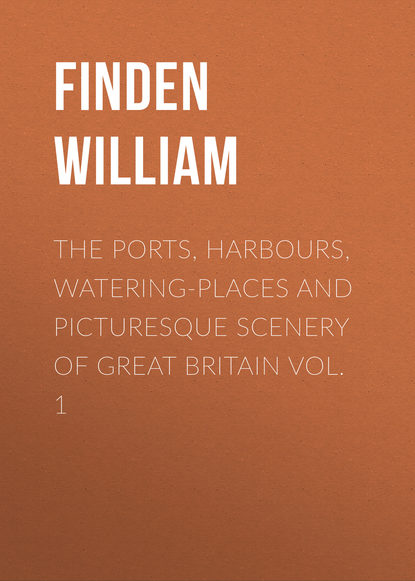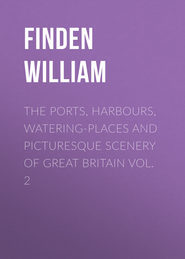По всем вопросам обращайтесь на: info@litportal.ru
(©) 2003-2024.
✖
The Ports, Harbours, Watering-places and Picturesque Scenery of Great Britain Vol. 1
Настройки чтения
Размер шрифта
Высота строк
Поля
The country around Lytham abounds in fine drives; and, independently of the minor points, which cannot fail to engage the attention of visitors, the ancient town of Preston will offer a full day's entertainment to all who are curious in historical sites. The lordship of Preston was granted by Richard the First to Theobald Walter, seneschal of Ireland, ancestor of the dukes of Ormond, and sheriff of Lancashire; and by Edward the Third it was constituted the chief seat of the duchy and palatinate courts. King James the First honoured it with a visit in his progress to Scotland, in 1617; and on Ribbleton Moor, on the east side of the town, the Scottish forces, under the Duke of Hamilton, sustained a serious defeat in 1648 – the last operation of the civil war in this country. In 1715 the Chevalier de St. George was proclaimed at the Market-cross, by the title of James the Third; and in 1745 the troops, under Prince Charles Edward, marched through the town to the Jacobin air of "The king shall have his sin again." This lively tune, however, as the reader knows, was changed into a melancholy dirge on his return through Preston – only a fortnight afterwards. The celebrated Preston Guild, which is held once in twenty years, is considered to be one of the most splendid provincial festivals in England. The institution of this ancient and unique pageant is five centuries old, the first having taken place in the reign of Edward III. It commences on the Monday after the day set apart by the Church in commemoration of the beheading of St. John the Baptist (the 29th August), and continues about a fortnight. By the charter which renders the celebration necessary twenty-eight days are allowed to all who are disposed to renew their freedom. On the first day the different trades muster in number, form processions, and attend the mayor and corporation to church; the following day the ladies of Preston, with the mayoress, are escorted in the like manner, and various festivities are encouraged during the time. On Wednesday the races commence; the race ground is about two miles distant, on Falwood Moor, anciently a part of the royal forest of the same name. Preston Guild was celebrated three times during the reign of George III., an event that never occurred in the reign of any other king of England.
SOUTHPORT SANDS. LANCASHIRE
There's Buxton bath for gout and spleen;
There's Cheltenham for wealth;
There's Matlock vale for Beauty's queen;
And Southport Sands for health.
Southport – formerly South Hawes – is about two miles to the southward of North Meols, near the estuary of the Ribble, and opens upon a magnificent bay. Its situation among the dry sand-hills, or meols, contributes much to the salubrity of the place, and it appears to gain in popularity as it becomes more generally known.
This popular watering-place is of modern erection, as in the year 1809 it contained only eighty-eight houses, but it no sooner obtained the patronage of the wealthy and active merchants of Lancashire, than it sprung up with rapid strides, and those numerous appliances of luxury which its patrons know so well how to appreciate were produced in abundance, while the low, barren sand-hills of this part of the coast were soon covered with spacious hotels, boarding-houses, baths, and all the essentials of a fashionable sea-bathing town. There is no doubt but that at some period the sea must have covered much of what is now dry land, as in the churchyard of North Meols, sea shells, in considerable numbers, are frequently found when the ground is opened for graves, to the depth of five or six feet.
In the vicinity of Southport, and forming part of the same parish, is Martin (or more properly Merton) Meer, once an extensive morass. In Leland's time, it was four miles long and two broad, and emptied itself into the sea. About 1692, Mr. Fleetwood, of Bank Hall, commenced draining this meer by a sluice, shutting and opening with the tide, and died with the idea that he had completed the work. When the water was drained off, eight canoes were found, scooped out of the trunks of trees, in the same mode as they are made among the Indians of the Pacific at this day; one of them had plates of iron fixed upon it, and all were constructed probably before the Roman possession of Britain. In 1755, the Meer was again inundated by a very high tide, owing to the insufficiency of the sluice-gates, and Mr. Eccleston, of Scarisbrick, made a second attempt to drain it, and succeeded until 1789, when a partial inundation from the river Douglas did some mischief, but more extensive injury was prevented by the action of some floodgates, which had been erected to guard against such accidents. In 1813, the sea-gates were again swept away, but the land was protected by the stop-gates as before. Since that time a great improvement has taken place in the Meer, and much of it is now good land.
The practice of sea-bathing – if we may judge by the much improved accommodations at Southport and along the coast – appears to be on the increase. There are many, indeed, who a few years ago would hardly have been persuaded to dip their fingers in salt-water; but, having once become converts to that salutary habit, they would now suffer many privations rather than forego their annual visits to the cheerful "sands" and sea-breezes of their native coast. After an indulgence of this nature, the man of business returns fresh-braced to his counting-house, the student to his books, each with renewed strength and resolution to perform their several duties in the great drama of active life. We are in hopes that those of our compatriots who have really the means of such enjoyment at their command, will at length do justice to the beauty of their own shores. The millions that are squandered in perambulating foreign lands, under the specious pretext of recovering health, or in pursuit of amusement, if spent in England would secure for their owners at least something like an equivalent for their money, and testify in their own persons and in everything around them, not only proofs of good judgment, but praise for their patriotism. This mania, which for so many years has deprived our native watering-places of their legitimate revenue, is certainly on the decline; and we speak from much experience in foreign travel, when we state that, to a well regulated mind, England alone presents, in the greatest proportion, the true requisites for health and rational enjoyment. In no other country of the world is the word "comfort" so well understood; and in no other climate – "damp and dripping" as it has been pronounced by certain morbid peripatetics – can we promise ourselves so much out-door luxury and enjoyment as at "home." But to him who still entertains a doubt on this point, and prefers, with Lucullus, to change his quarters, we recommend Southport by way of experiment, and have no doubt that he will soon make a voluntary surrender of his prejudices.
notes
1
Mackarel is found in large shoals, especially on the French and English coasts. This fish enters the English Channel in April, and, as the summer advances, is found on the coasts of Cornwall, Sussex, Normandy, Picardy, &c., where the fishing is most considerable.
2
Herrings are also remarkable as appearing in immense shoals – many miles in extent, and several fathoms in depth. Their presence is easily discovered by the flights of sea-fowl which accompany them, by the unctuous matter with which the water is covered, and in the night by the brilliant phosphoric light which they emit. They are very plentiful about the Orkney Isles in June and July, in the German Ocean in September and October, and in the English Channel in November and December.
3
The London fishmongers are said to prefer the Lowestoff herrings to those cured at Yarmouth, although they are generally retailed under the name of "Yarmouth Herrings."
4
The inscription on the foundation-stone contains a bad pun: "Quo tempore civium Gallicorum ardor vesanus prava jubentium gentes turbavit Europeas ferreo bello, Rolandus Burdon armiger, meliora colens, Vedræ ripas, scopulis præruptis, ponte conjungere ferreo statuit."
5
Surtees's Hist. of Durham, vol. 1, p. 226.
6
Evidence of Sir Cuthbert Sharp before the Lords' Committee on the Coal Trade, 1829, p. 23.
7
Mr. Buddle, of Wallsend, whose statistics of the coal-trade have been quoted by McCulloch and other writers on the subject.
8
The moon is said to "wade" when she seems as if toilfully making her way through a succession of clouds, which flit rapidly past her.
9
History of Northumberland, vol. i. p. 594. Edit. 1810.
10
The other three were Roxburgh, Stirling, and Edinburgh.
11
For many of the preceding facts we are indebted to the New Statistics of the Town and Port of Dundee, a work indispensable to all who desire correct information on the subject.
12
Monipennie's Scots Chronicles. London, 1612.
13
Two hundred and fifty feet, according to more recent admeasurement.
14
The accompanying view has been justly pronounced as by far the best that has ever appeared of this remarkable scene, and is taken at the same point from which it was contemplated by Dr. Johnson, after his walk from Slaines Castle, about two miles distant. Sir Walter Scott, when on his excursion to the Shetland Isles, and while becalmed off this coast, paid a visit to the Buller; and we are of opinion (says Mr. Mackie), that in his description of the Cavern of Staffa, we can discover some of the general features of the scene described, shadowed forth in the Lord of the Isles. It is proper to mention, that although now generally written Buller, it is uniformly known in the district as the Bullers—Les Bouilloirs, or boiling caldrons.
15
Netherhall, the seat of Humphry Senhouse, Esq., contains a fine collection of Roman antiquities, found at Ellenborough. It was visited, so far back as 1599, by Sir Robert Cotton and his friend Camden.
16
Dr. Hall was born in 1574, and, in 1624, refused the see of Gloucester; but three years afterwards accepted that of Exeter, from which he was translated, in 1641, to that of Norwich. A few years subsequent to this event he was sent to the tower, with twelve other prelates, for protesting against any laws passed in Parliament during their forced absence from the House. In June of the following year he obtained his release; but shortly after suffered much persecution from the Puritans, who plundered his house and despoiled the cathedral. His private estate was also sequestered; and thus in his old age he was reduced to poverty, which he bore with great fortitude, and continued to preach as long as his health permitted. He was author of the well-known Meditations, was a poet of considerable genius, and with great wit and learning united a spirit of true meekness and piety. His works have gained for him the appellation of "the Christian Seneca." He died in 1656.
17
"I've climb'd the Alps, – I've cross'd the seas,
And travers'd many a land,
Where summer smiles on spicy isles,
And coral decks the strand:
But the fairest spot that Earth can boast,
Is here, by the blue sea-wall,
And the fairest maid on her native coast
Is the Lass of Lytham Hall," &c. &c.






